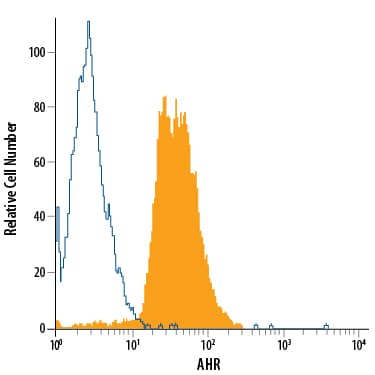Mouse AHR Alexa Fluor® 488-conjugated Antibody
R&D Systems, part of Bio-Techne | Catalog # IC6697G


Key Product Details
Species Reactivity
Applications
Label
Antibody Source
Product Specifications
Immunogen
Asn706-Ser805 (Thr758Ala)
Accession # P30561
Specificity
Clonality
Host
Isotype
Scientific Data Images for Mouse AHR Alexa Fluor® 488-conjugated Antibody
Detection of AHR in C2C12 Mouse Cell Line by Flow Cytometry.
C2C12 mouse myoblast cell line was stained with Sheep Anti-Mouse AHR Alexa Fluor® 488-conjugated Antigen Affinity-purified Polyclonal Antibody (Catalog # IC6697G, filled histogram) or isotype control antibody (Catalog # IC016G, open histogram). To facilitate intracellular staining, cells were fixed with Flow Cytometry Fixation Buffer (Catalog # FC004) and permeabilized with Flow Cytometry Permeabilization/Wash Buffer I (Catalog # FC005). View our protocol for Staining Intracellular Molecules.Applications for Mouse AHR Alexa Fluor® 488-conjugated Antibody
Intracellular Staining by Flow Cytometry
Sample: C2C12 mouse myoblast cell line fixed with Flow Cytometry Fixation Buffer (Catalog # FC004) and permeabilized with Flow Cytometry Permeabilization/Wash Buffer I (Catalog # FC005)
Formulation, Preparation, and Storage
Purification
Formulation
Shipping
Stability & Storage
- 12 months from date of receipt, 2 to 8 °C as supplied.
Background: AHR
AHR (Aryl-hydrocarbon receptor; also bHLHE76) is a 100-105 kDa member of the bHLH/PAS transcription factor family. It is widely expressed and serves many functions. First, it binds multiple xenobiotic chemicals in the cytoplasm. This induces dimerization with ARNT, translocation to the nucleus, and activation of P450 genes such as CYP1A1 and UGT1A6. Second, it appears to block cell cycle progression, possibly via a downregulation of CDK proteins. And third, it blocks apoptosis by interacting with E2F1, thus silencing Tap73 and Apaf1 genes. Mouse AHR precursor is 848 amino acids (aa) in length. It contains a nine aa prosegment, plus an 839 aa mature molecule that contains a DNA binding motif (aa 12-39), a bHLH region (aa 40-80), two PAS domains (aa 116-336) and one PAC segment that stabilizes the PAS domains (aa 342-383). There are multiple alleles for mouse AHR. One 95-97 kDa allele shows a premature truncation after Ser805, while a second 112 kDa allele shows a 41 aa substitution for aa 843-848. Over aa 706-805, mouse AHR shares 87% and 63% aa identity with rat and human AHR, respectively.
Long Name
Alternate Names
Gene Symbol
UniProt
Additional AHR Products
Product Documents for Mouse AHR Alexa Fluor® 488-conjugated Antibody
Product Specific Notices for Mouse AHR Alexa Fluor® 488-conjugated Antibody
This product is provided under an agreement between Life Technologies Corporation and R&D Systems, Inc, and the manufacture, use, sale or import of this product is subject to one or more US patents and corresponding non-US equivalents, owned by Life Technologies Corporation and its affiliates. The purchase of this product conveys to the buyer the non-transferable right to use the purchased amount of the product and components of the product only in research conducted by the buyer (whether the buyer is an academic or for-profit entity). The sale of this product is expressly conditioned on the buyer not using the product or its components (1) in manufacturing; (2) to provide a service, information, or data to an unaffiliated third party for payment; (3) for therapeutic, diagnostic or prophylactic purposes; (4) to resell, sell, or otherwise transfer this product or its components to any third party, or for any other commercial purpose. Life Technologies Corporation will not assert a claim against the buyer of the infringement of the above patents based on the manufacture, use or sale of a commercial product developed in research by the buyer in which this product or its components was employed, provided that neither this product nor any of its components was used in the manufacture of such product. For information on purchasing a license to this product for purposes other than research, contact Life Technologies Corporation, Cell Analysis Business Unit, Business Development, 29851 Willow Creek Road, Eugene, OR 97402, Tel: (541) 465-8300. Fax: (541) 335-0354.
For research use only